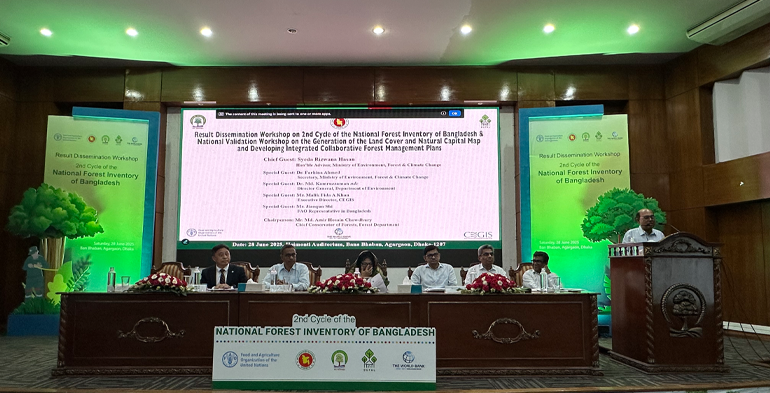
Agrilife24.com – Forest Department of Bangladesh, with technical support from Food and Agriculture Organization of the United Nations (FAO) and financial support from the World Bank through the Sustainable Forests and Livelihoods (SUFAL) project, hosted a “Result Dissemination Workshop of the Second Cycle of the National Forest Inventory (NFI)” on 28th June 2025, at Hoimonti Auditorium, Ban Bhaban, Dhaka.
The 2nd cycle of the National Forest Inventory, implemented from March 2024 to early 2025, covered 1,858 permanent sample plots across five zones: Sundarbans, Hill, Sal, Coastal, and Village zones. Among these, 1,702 plots were accessible, while 47 were inaccessible and 109 were not sampled due to natural and anthropogenic constraints. The inventory also included 6,400 household surveys nationwide, providing crucial insights into community-level forest dependence and socio-economic dimensions of forest use.
Syeda Rizwana Hasan, Hon’ble Adviser to the Ministry of Environment, Forest and Climate Change (MoEFCC) joined the program online as Chief Guest and Dr. Farhina Ahmed, Secretary of MoEFCC; and Dr. Jiaoqun Shi, FAO Representative in Bangladesh, as Special Guest were present at the event. Mr. Md. Amir Hosain Chowdhury, Chief Conservator of Forests, chaired the session.
In her remarks, Syeda Rizwana Hasan, Hon’ble Adviser MoEFCC, emphasized the value of the NFI in supporting Bangladesh’s national and international environmental commitments, including the Sustainable Development Goals (SDGs), the Reduction of Emission from Deforestation and Forest Degradation (REDD+), and the United Nations Framework Convention on Climate Change (UNFCCC). She also mentioned that this inventory is not just a dataset; it is a strategic asset. “The National Forest Inventory provides us with reliable, country-specific data essential for tracking carbon stocks, monitoring biodiversity, and developing sustainable forest policies,” she said.
Jiaoqun Shi, FAO Representative in Bangladesh, mentioned that with FAO’s continuous support, Bangladesh now stands as a regional leader in forest inventory. He stated, “FAO is proud to support this process that not only delivers credible and verifiable forest data, but also builds national capacity, strengthens institutions, and promotes inclusive participation.”
With advanced tools such as remote sensing, Geographical Information System (GIS) mapping, and updated forestry gear, NFI allows for more accurate reporting and targeted action on forest degradation and climate adaptation. NFI is a cornerstone for sustainable natural resource management in Bangladesh.
Additionally, presentations from key technical experts, Zaheer Iqbal, Rajib Mahamud, and Dr. Nikhil Chakma, highlighted trends in forest biomass, carbon pools, land use change, and socio-economic linkages. The workshop underscored the importance of integrating forest monitoring data into national planning instruments, including the Bangladesh Climate Change Strategy and Action Plan (BCCSAP), National Adaptation Plan (NAP), and Forestry Master Plan 2017–2036.
In his closing remarks, Md. Amir Hossain Chowdhury, Chief Conservator of Forests and Chair of the program, highlighted the integration of biophysical and socio-economic data in the inventory, its nationwide coverage, and the use of advanced tools and inclusive field strategies. “Let this not be the end of a project, but the beginning of a permanent, country-led forest monitoring system,” he stated.
The completion of the Second National Forest Inventory will pave the way for data-driven decision-making in ensuring sustainable forest management, benefiting local communities. By generating high-quality, nationally representative data, this initiative strengthens the country’s ability to conserve biodiversity, monitor carbon stocks, restore degraded landscapes, and respond to the growing threats of climate change.
The initiative will empower communities, especially those living in and around forest areas, with information that supports equitable, inclusive decision-making and sustainable livelihoods. FAO Bangladesh will continue working alongside the Government and national stakeholders to scale up forest monitoring, promote nature-based solutions, inform climate finance efforts, and integrate forest data into policies that protect both ecosystems and the well-being of the people who depend on these resources. This will ensure FAO’s commitment to building a greener, more resilient future through a Better Environment and a Better Life for all.
























